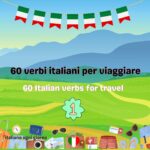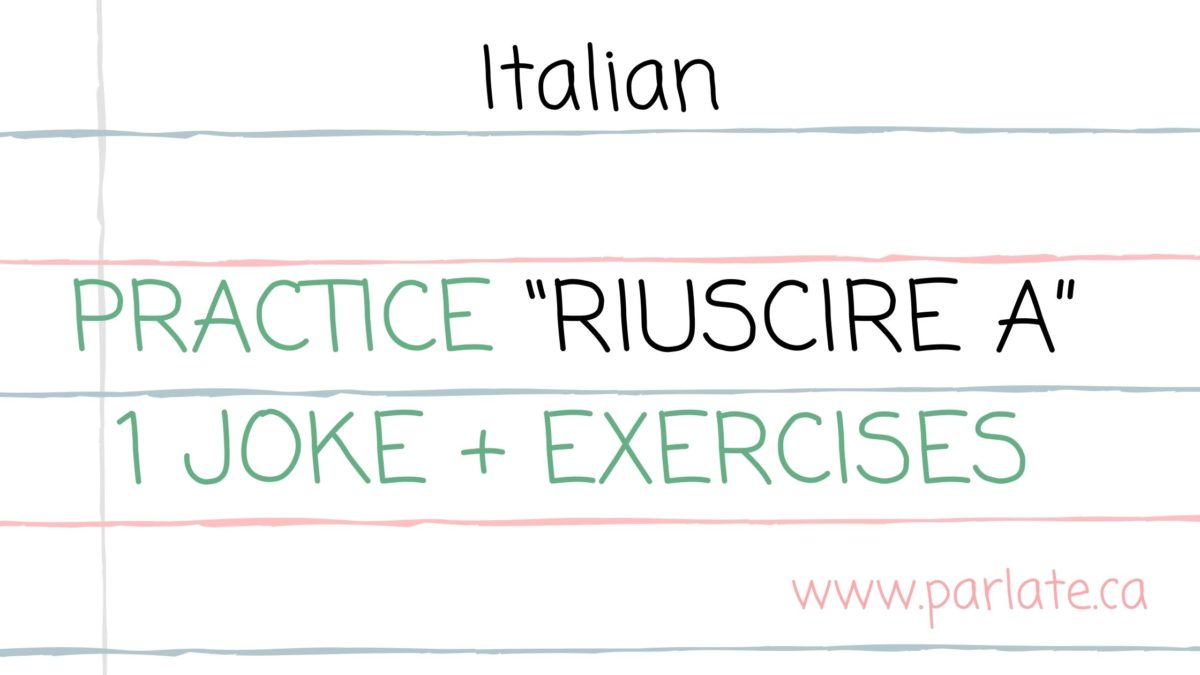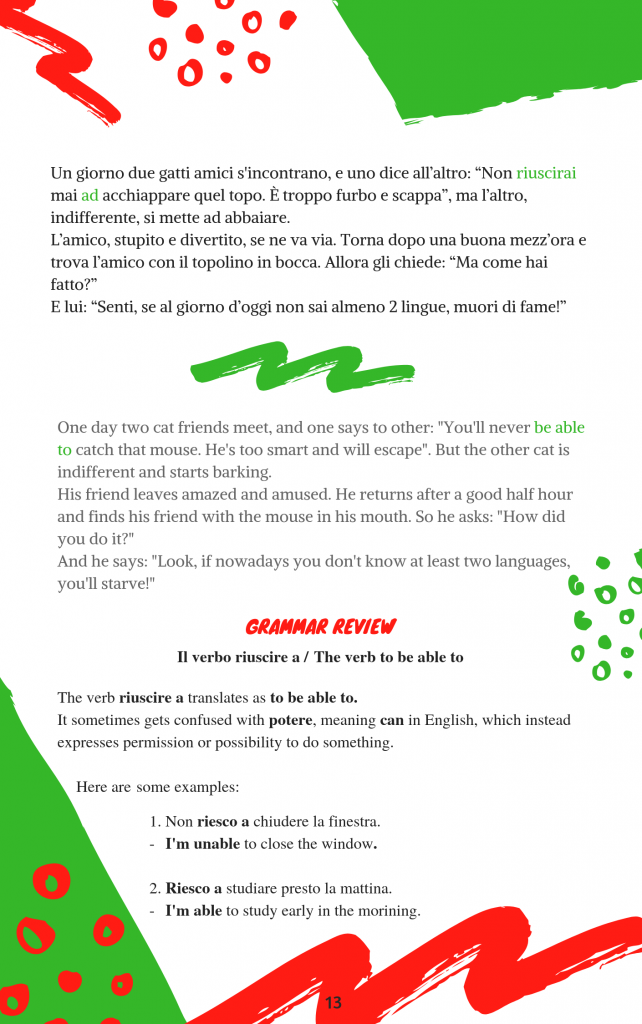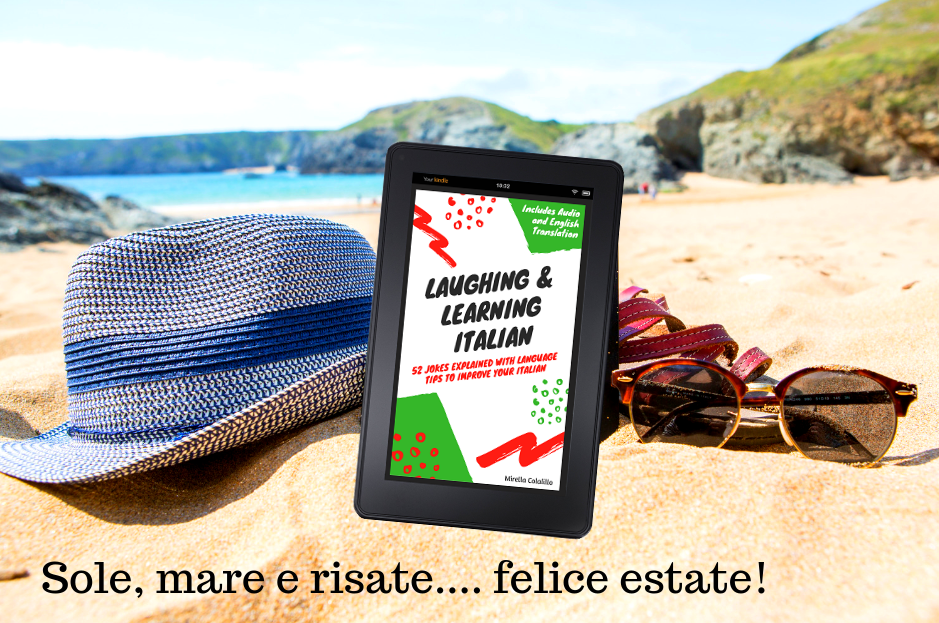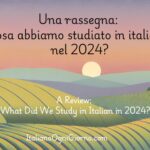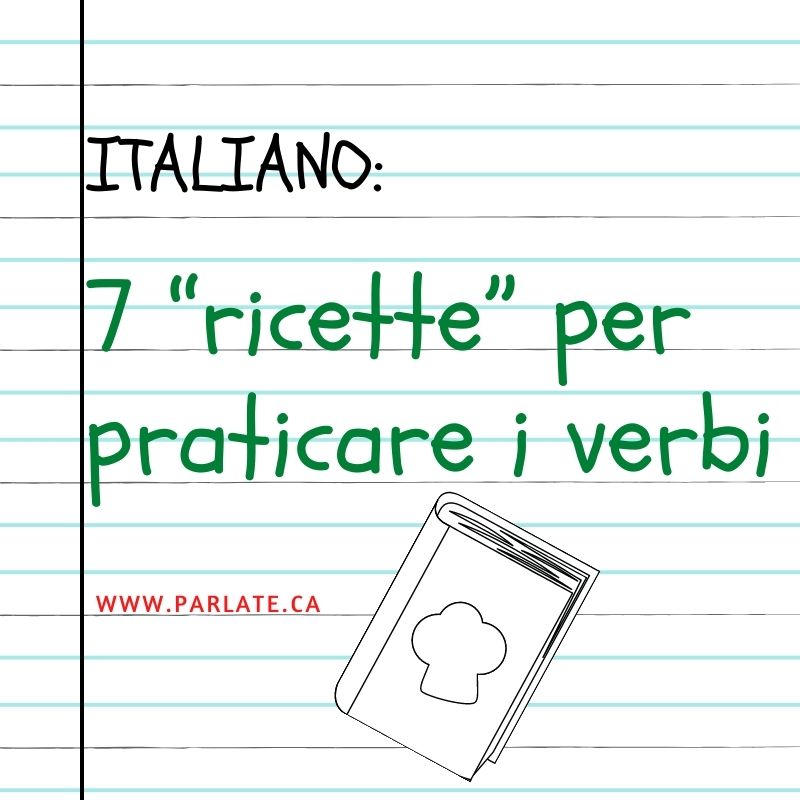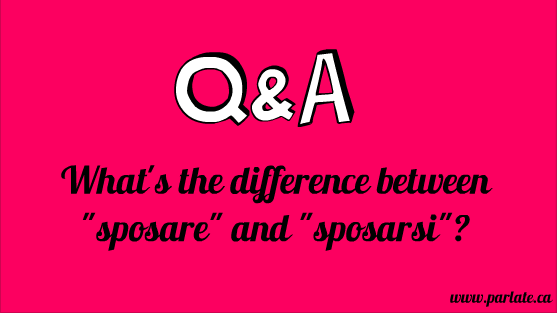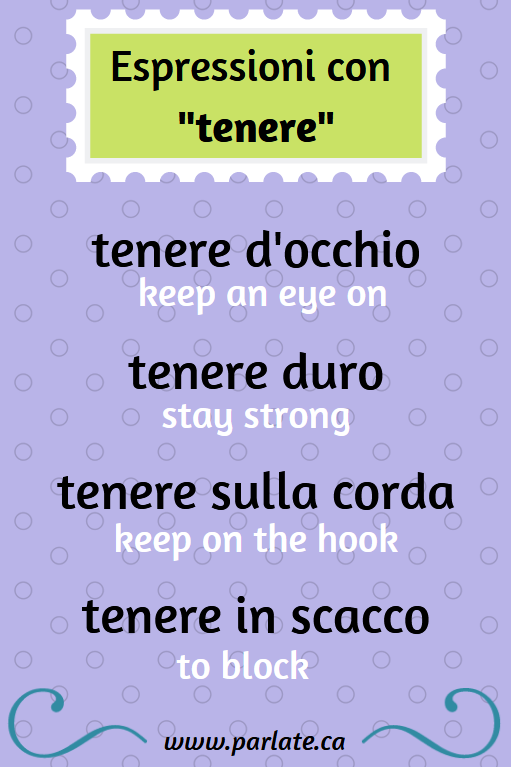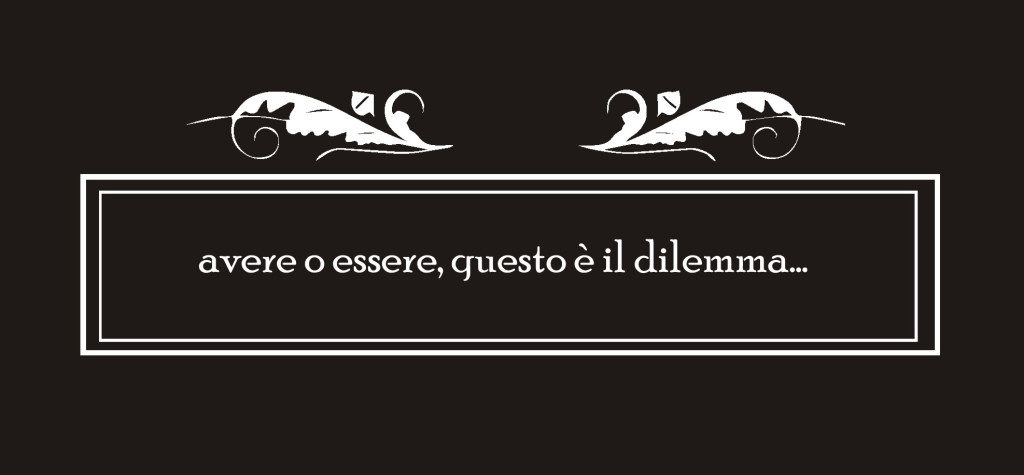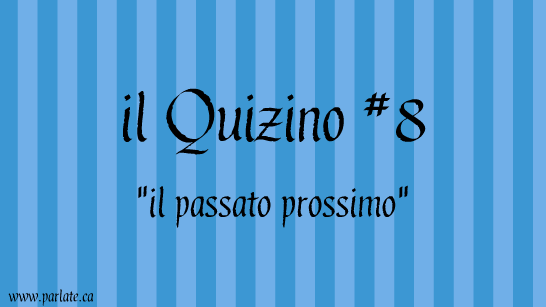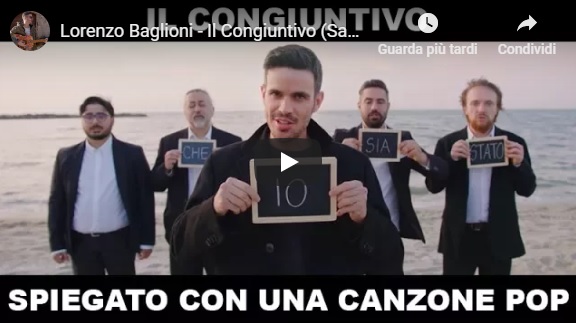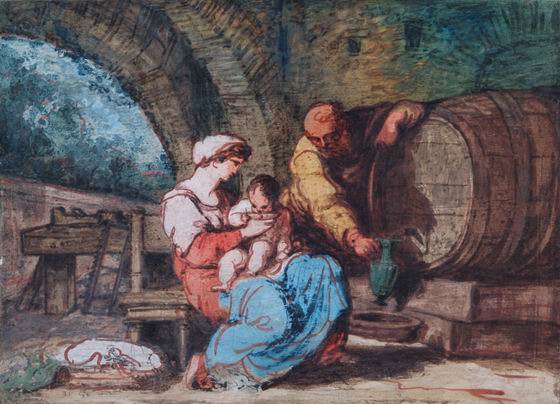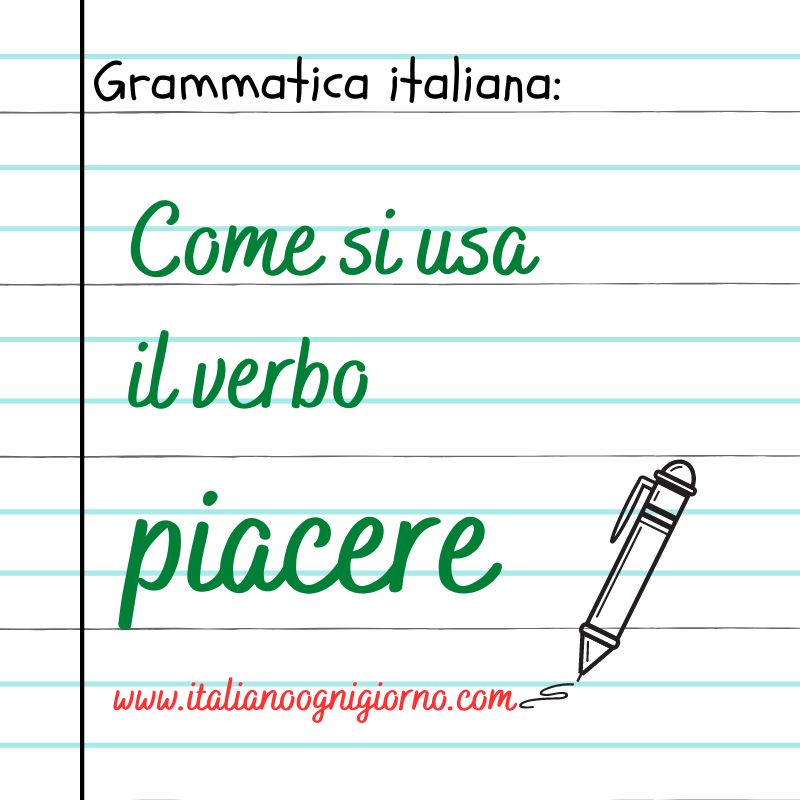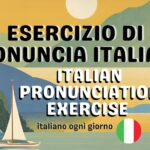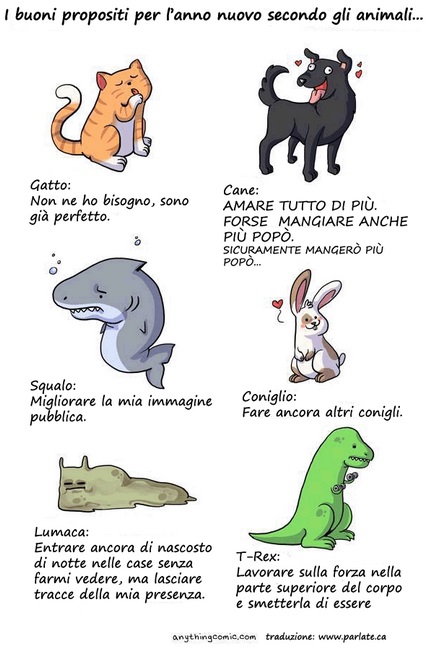Scrolla giù e scrivi una frase con la parola del giorno nei commenti.
Scroll down and write a sentence with the word of the day in the comments.
PAROLA DEL GIORNO:
469. il polpaccio – the calve (sostantivo) / I danzatori riscaldano i polpacci prima di ballare. – Dancers warm up their calves before dancing.
468. rugginoso – rusty (aggettivo) / Tutta la ringhiera della scala esterna era rugginosa. – The entire railing on the outside staircase was rusty.
467. l’appiglio – the grip (sostantivo) / Sull’autobus ci vorrebbero degli appigli più bassi. – There should be lower handholds on the bus.
466. terso – clear (aggettivo) / Se avessi notato il cielo terso, non avrei preso l’ombrello. – If I had noticed the clear sky, I would not have taken the umbrella.
465. il viavai – the comings and goings (sostantivo) / Ci sarà un viavai di turisti nell’alta stagione. – There will be a coming and going of tourists in the high season.
464. il taccuino – the notebook (sostantivo)/ Durante le sue passeggiate schizzava di sovente nel suo taccuino da disegno. – During her walks she often sketched in her sketching notebook.
463. il contegno – the composure (sostantivo)/ Non mostrava alcun contegno al banco del rinfresco del ristorante. – He showed no composure at the restaurant refreshment counter.
462. malfermo – unsteady (aggettivo) / Con una mano malferma ha disegnato una linea storta. – With an unsteady hand he drew a crooked line.
461. la mappatura – the mapping (sostantivo) / Avremo bisogno di una mappatura del sito archeologico. – We will need a mapping of the archaeological site.
460. strusciare – to rub (verbo)/ Attenzione a non strusciare la giacca contro lo sporco. – Be careful not to rub the jacket against dirt
459. tacito – tacit (aggettivo)/ Un tacito consenso fu raggiunto tra le parti. – A tacit consensus was reached between the parties.
458. l’imprecazione – the curse (sostantivo) / Pare che dire imprecazioni ci faccia bene sentire meglio. – It seems that cursing makes us feel better.
457. convenire – to agree (verbo) / I clienti del ristorante hanno convenuto che il servzio era ottimo. – The restaurant clients agreed that the service was excellent.
456. inserire – insert (verbo) / Inserisci i gettoni nella fessura al lato. – Insert the tokens into the slot on the side.
455. la caterva – the loads (sostantivo) / Ogni giorno gli alunni avevano una caterva di compiti. – Every day the students had loads of homework.
454. di lì a poco – soon (avverbio) / Sarebbero partiti di lì a poco. – They would be leaving soon.
453. il cibo da asporto – the take-out food (sostantivo) / Abbiamo preso del cibo da asporto per il lungo viaggio. – We got some take-out for the long journey.
452. autorevole – authoritative (aggettivo) / Dirigono il paese in modo autorevole e non autoritario. – They run the country in an authoritative and not authoritarian manner.
451. ingenuo – naive (aggettivo) / Se fossi stata ingenua, mi sarei bevuta ogni sua bugia. – If I had been naive, I would have believed every one of his lies.
450. il recinto – the fence (sostantivo) / Ci vorrebbe un recinto per proteggere il giardino dal calpestio. – A fence would be needed to protect the garden from trampling.
449. mordicchiare – to nibble (verbo) / Chi ha mordicchiato il mio biscotto? – Who nibbled my cookie?
448. il paragone – the camparison (sostantivo) / Fare il paragone tra i due ristoranti è difficile essendo ognuno unico. – Making a comparison between the two restaurants is difficult as each is unique.
447. essere affamato – to be hungry (verbo) / Sembra che voi siate molto affamati. – It looks like you are very hungry.
446. mettere a mollo – to soak (verbo) / Bisogna mettere i fagioli secchi a mollo prima di cucinarli. – Dried beans must be soaked before cooking.
445. lo stratagemma – the ploy, trick (sostantivo) / Useremo uno stratagemma per raccogliere le olive in meno tempo. – We will use a trick to harvest olives in less time.
444. l’andatura – the gait (sostantivo) / La riconoscerei a distanza dalla sua andatura elegante. – I could recognize her from a distance by her elegant gait.
443. le vertigini – the vertigo (sostantivo) / A causa delle vertigini non riusciva ad alzarsi dal letto. – Due to vertigo he couldn’t get out of bed.
442. per giunta – moreover – (avverbio) / I primi erano squisiti e, per giunta, abbondanti. – The first courses were exquisite and, moreover, abundant.
441. appartenere – to belong (verbo) / A chi appartiene questa sciarpa? – Who does this scarf belong to?
440. il calzolaio – the shoemaker (sostantivo) / Andrà dal calzolaio a riparare le scarpe. – He’s going to the shoemaker to repair his shoes.
439. sopito – attenuated, dormant (aggettivo) / Coltivano un interesse mai sopito per la lingua italiana. – They cultivate a never dormant interest in the Italian language.
438. il rivestimento – the lining (sostantivo) / Il sarto mi ha ricucito il rivestimento del cappotto. – The tailor sewed the lining of my coat back together.
437. lo screzio – the disagreement (sostantivo) / Avevano avuto uno screzio, ma hanno subito risolto. – They had had a disagreement, but they resolved it immediately.
436. la molla – the spring, elastic (sostantivo) / Mi serve una molla per chiudere la bustina. – I need an elastic to close the bag.
435. sgretolare – to shatter, crumble (verbo) / La caduta violenta dal balcone ha sgretolato il vaso. – The violent fall from the balcony shattered the vase.
434. il fuso orario – the time zone (sostantivo) / Ci vorranno alcuni giorni per abituarci al nuovo fuso orario. – It will take a few days to get used to the new time zone.
433. il colino – the colander (sostantivo) / E se usassimo il colino per scolare le verdure? – What if we used a colander to drain vegetables?
432. giacché – since (congiunzione) / Giacché sei del posto, mi diresti dove prendere un buon caffè ? – Since you’re local, could you tell me where to get a good coffee?
431. l’onta – the shame (sostantivo) / Col tempo supererete l’onta della sconfitta. – In time you will overcome the shame of defeat.
430. affusolato – tapered (aggettivo) / La pianista ha delle belle dita affusolate. – The pianist has beautiful tapered fingers.
429. Le une dalle altre – to each other (avverbio) / Le caramelle si sono attaccate le une alle altre nella busta. – The candies stuck to each other in the bag.
428. la cintura di sicurezza – (sostantivo) / Non dimenticate di allacciarvi la cintura di sicurezza. – Don’t forget to fasten your seat belt.
427. nel contempo – at the same time (avverbio) / Il cuoco nel contempo preparava molti piatti. – The cook was preparing many dishes at the same time.
426. avvincente – compelling (aggettivo) /Mi consiglieresti un film giallo avvincente? – Can you recommend me a compelling mystery film?
425. la raffica – the gust (sostantivo) /Le forti raffiche di vento mi impedivano di pedalare. – Strong gusts of wind prevented me from pedaling.
424. ravvisare – recognize (verbo) / Per fortuna hanno ravvisato i guasti prima che fosse troppo tardi. – Luckily they recognized the faults before it was too late.
423. la specificità – the specific nature (sostantivo) /Durante il corso si tiene conto delle specificità di ogni attività. – The specific natures of each activity are taken into account during the course.
422. recepire – to receive (verbo) / Pare che non abbiano ben recepito il nostro messaggio. – It seems they didn’t receive our message well.
421. il pannello di controllo – the dashboard (sostantivo) / Nel pannello di controllo potrai regolare la luminosità dello schermo. – In the control panel you can adjust the brightness of the screen.
420. il bottino – the loot (sostantivo) / Nascosero il bottino in cantina. – They hid the loot in the cellar.
419. capovolto – upside down (aggettivo) / L’aereo era capovolto sulla pista d’atterraggio. – The plane was upside down on the runway.
418. stare sotto schiaffo di – to be under the thumb (verbo) / Staremo sotto schiaffo dei ricchi e potenti? – Will we be under the thumb of the rich and powerful?
417. nevralgico – crucial (aggettivo) / Quale sarebbe il punto nevralgico della questione? – What would be the crux of the matter?
416. impostato – fake (aggettivo) / Il suo fare impostato mi rendeva scettica. – His fake manner made me skeptical.
415. largamente – widely (avverbio)/ Quel libro era largamento studiato nei licei. – That book was widely studied in high schools.
414. irrorare – irrigate (verbo) / Dovreste irrorare l’orto, altrimenti le piante si seccheranno. – You should irrigate the garden otherwise the plants will dry out.
413. clamoroso – resounding (aggettivo) / Il musicista ricevette un clamoroso applauso. – The musician received a resounding applause.
412. la baggianata – nonsense (sostantivo) / Credo che tu dica una marea di baggianate! – I think you’re talking a lot of nonsense!
412. la baggianata – nonsense (sostantivo) / Credo che tu dica una marea di baggianate! – I think you’re talking a lot of nonsense!
411. prettamente – mainly (avverbio) / Il ristorante offre un menù con ingredienti prettamente locali. – The restaurant offers a menu with mainly local ingredients.
410. essere restio – to be reluctant (verbo) / Durante il volo ero restia a mangiare il cibo dell’aereo. – During the flight I was reluctant to eat airplane food.
409. spaventarsi – to be scared (verbo) / Se sentite fracasso mentre cucino, non spaventatevi! – If you hear a loud noise while I’m cooking, don’t be scared!
408. la diceria – rumor (sostantivo) / Circolavano delle dicerie false sul suo conto. – There were false rumors circulating about him.
407. l’umorismo – the humor (sostantivo) / Ci vuole umorismo per affrontare le difficoltà. – It takes humor to face difficulties.
406. ritirare – to pick up (verbo) / Dovremmo ritirare il pacco alle poste entro oggi. – We should pick up the package at the post office today.
405. gagliardo – vigorous (aggettivo) / Con passo gagliardo il cane ci venne incontro. – With a vigorous stride the dog came towards us.
404. il lampo – the flash (sostantivo) / In un lampo ha deciso quale autobus prendere. – In a flash he decided which bus to take.
403. sfinito – exhausted (aggettivo) / Gli atleti erano sfiniti dopo la gara. – The athletes were exhausted after the competition.
402. accertarsi – to make sure (verbo) / Accertiamoci di avere con noi i documenti necessari. – Let’s make sure we have the necessary documents with us.
401. deluso – disappointed (aggettivo) / Molti spettatori saranno delusi dallo spettacolo. – Many viewers will be disappointed by the show.
400. il preventivo – the quote (sostantivo) / Dovremmo chiedere un preventivo prima dei lavori. – We should ask for a quote before the works.
399. la scommessa – the bet (sostantivo) / E’ probabile che voi vinciate la scommessa. – You are likely to win the bet.
398. arretrare – to move back (verbo) / Arretrate di qualche passo, per favore. – Please move back a few steps.
397. altrove – elsewhere (avverbio) / Siccome il negozio non ha la passata di pomodoro, andremo a cercarla altrove. – Since the store doesn’t have tomato puree, we’ll go look for it elsewhere.
396. smagliante – dazzling (aggettivo) / Gli organizzatori ci accolsero con dei sorrisi smaglianti. – The organizers welcomed us with dazzling smiles.
395. sminuzzare – to crumble, to crush (verbo)/ Il peso della borsa ha sminuzzato i biscotti. – The weight of the bag crushed the cookies.
394. a ridosso di – right next to (aggettivo) / L’albergo era a ridosso della montagna franosa. – The hotel was right next to the landslide mountain.
393. il tasto – the button (sostantivo) / Se il tasto non funzionasse, chiama il tecnico. – If the button doesn’t work, call the technician.
392. avercela (con) – to be upset with (verbo) / Credo che ce l’abbiano con noi per non averli visti. – I think they’re angry with us for not seeing them.
391. la tenda – the curtain (sostantivo) / Ho tirato la tende giacche il sole picchiava forte. – I pulled the curtains because the sun was very strong.
390. il vincolo – the constraint (sostantivo) / Il documento elenca i vincoli legali tra le parti. – The document lists the legal constraints between the parties.
389. insudiciare – to soil (verbo) / Non insudiciare il pavimento appena lavato del corridoio. – Don’t soil the freshly washed hallway floor.
388. impolverato – dusty (aggettivo) / Quando torneremo dal viaggio la casa sarà impolverata. – When we return from the trip the house will be dusty.
387. la fessura -the crevice, cracks (sostantivo) /Attraverso le fessure passavano gli spifferi. – Drafts passed through the crevices.
386. scocciato – irritated (aggettivo) / Il commesso sembrava scocciato di rispondere alle loro domande. – The clerk seemed annoyed at answering their questions.
385. maleducato – rude (aggettivo) / I suoi vicini maleducati sporcavano il marciapiede con la loro immondizia. – His rude neighbors littered the sidewalk with their garbage.
384. la soglia – threshold (sostantivo) / Mi tolgo gli stivali bagnati sulla soglia della porta. – I take off my wet boots on the doorstep.
383. il decennio – the decade (sostantivo) / Il prossimo decennio potrebbe essere molto diverso da questo. – The next decade could be very different from this one.
382. spiattellare – to blurt out (verbo) / Non puoi dirgli nulla, perché spiattella tutto a tutti! – You can’t tell him anything, because he’ll blurt it out everyone!
381. impegnativo – demanding(aggettivo) / Era un libro impegnativo da leggere. – It was a demanding book to read.
380. ininterrottamente – continuously (avverbio) /Lavoreremo ininterrottamente per rispettare la scadenza. – We will work continuously to meet the deadline.
379. raggrinzire -to wrinkle (verbo) / La camicia è raggrinzita dopo il lavaggio. – The shirt is wrinkled after washing.
378. svuotare – to empty (verbo) / Prima di partire svuoterò il frigorifero. – Before leaving I will empty the refrigerator.
377. la disinvoltura – the ease (sostantivo) / Parlava con disinvoltura nonostante l’italiano non fosse la sua madrelingua. – He spoke with ease even though Italian was not his native language.
376. sciocciato – shocked (aggettivo) / Eravamo tutti scioccati che avesse fatto due metri di neve. – We were all shocked that it had snowed two meters.
375. alla stregua di -the same way (sostantivo) / Secoli fa non vivevano alla stessa stregua di noi. – Centuries ago they didn’t live the same way as us.
374. il vezzo – the habit, penchant (sostantivo) / Pare che abbiate il vezzo di prendere il caffè dopo pranzo. – It seems you have a penchant for drinking coffee after lunch.
373. sovente – often (avverbio) / Mi fa piacere incontrarti sovente nelle mia passeggiate. – I am happy to meet you often on my walks.
372. intrufolarsi – to sneak in (verbo) / Si sono intrufolati al banchetto senza essere invitati. – They snuck into the banquet without being invited.
371. i titoli di coda – the closing credits (sostantivo) / Sono l’unica nel cinema che resta seduta e leggere i titoli di coda del film. – I’m the only one in the cinema who remains seated to read the closing credits of the film.
370. smascherare – to unmask (verbo) / Sono certa che smascheremo chi ha mangiato tutti i biscotti nel barattolo. – I’m sure we’ll unmask who ate all the cookies in the jar.
369. dettare – to dictate (verbo) / Se tu me dettassi la lettera, faremmo prima. – If you dictated the letter to me, it would be quicker.
368. calpestare – to tread on (verbo) / E’ fiabesca la neve fresca prima che venga calpestata. – Fresh snow before it’s trampled is like a fairy tale.
367. presunto – supposed, alleged (aggettivo) / Fare le compere dopo le feste natalizie è un presunto vantaggio. – Shopping after the Christmas holidays is a supposed advantage.
366. il palcoscenico – the stage (sostantivo) / Gli attori sono tornati sul palcoscenico per un ultimo inchino. – The actors returned to the stage for a final bow.
365. propizio/a – favorable (aggettivo) / Avendo nevicato in montagna, sarà una settimana propizia per andare a sciare. – Since it snowed in the mountains, it will be a favorable week for skiing.
364. l’avena – the oats (sostantivo) / Potrebbe aggiungere del latte d’avena al mio caffè? – Could you add some oat milk to my coffee?
363. snocciolare – to outline (verbo) / La direttrice ha snocciolato il piano finanziario per il nuovo anno. – The director outlined the financial plan for the new year.
362. assaporare – to savor (verbo) / Ha assaporato con gusto ogni morso di questa squisita pizza. – He savored every bite of this delicious pizza with gusto.
361. la polizza sanitaria – the health insurance (sostantivo) / Quando hai un sistema sanitario gratuito non ti serve la polizza sanitaria. – When you have a free health system you don’t need health insurance.
360. la mostarda – fruit mustard (sostantivo) / Domani Luisa farà della mostarda di mele. – Tomorrow Luisa will make fruit mustard.
358. frattanto – in the meantime (congiunzione) / Butto la pasta e frattanto prepara la tavola. – I’ll throw the pasta (in the boiling water) and in the meantime set the table.
357. pressochè – almost (avverbio) / Erano pressochè arrivati quando si è sgonfiata la ruota. – They were almost there when the tire went flat.
356. sostanziale – substantial (aggettivo) / Ci vorrebbe un sostanziale cambiamento nei mezzi di trasporto. – A substantial change in transportation is needed.
355. tartassare – to torment (verbo)/ A scuola ci tartassavano di compiti ogni giorno. – At school they bombarded us with homework every day.
354. l’annullamento – cancellation (verbo) / Si può richiedere l’annullamento del biglietto entro 24 ore dall’acquisto. – You can request cancellation of your ticket within 24 hours of purchase.
353. lo sviluppo – the development (sostantivo) / I Romani concepirono lo sviluppo di nuovi metodi di costruzione. – The Romans conceived the development of new construction methods.
352. sgranocchiare – to munch (verbo) / Mentre guardavamo il film, abbiamo sgranocchiato delle patatine. – While we watched the movie, we munched on some chips.
351. lo strumento – the tool (sostantivo) / Oggigiorno si utilizzano una molteplicità di strumenti digitali. – Nowadays, a variety of digital tools are used.
350. prescindere – to leave aside (verbo) / Giorgio vivrebbe in alta montagna prescindendo dai rigidi inverni. – Giorgio would live in the high mountains leaving aside / regardless of the harsh winters.
349. la noce moscata – the nutmeg (sostantivo) / Alla ricetta aggiungerei un pizzico di noce moscata. – I would add a pinch of nutmeg to the recipe.
348. a palate – in abundance (avverbio) / I politici italiani guadagnano soldi a palate. – Italian politicians make money in abundance.
347. la sottigliezza – the subtlety (sostantivo) / Il suo dipinto coglieva le sottigliezze emotive dei personaggi. – His painting captured the emotional subtleties of the characters.
346. inosservato – unnoticed (aggettivo) / Il cappello ingombrante della signora non è passato inosservato nella carrozza del treno. – The lady’s bulky hat did not go unnoticed in the train carriage.
345. repellere – to repel (verbo) / Per repellere le zanzare la notte usavo la citronella. – To repel mosquitoes at night I used citronella.
344. il paraocchi -the blinkers (sostantivo) / Togliti il paraocchi se non vuoi essere ingannato. – Take off your blinders if you don’t want to be fooled.
343. ammutolire – to silence (verbo) / La sua voce incantevole ha ammutolito tutti. – Her enchanting voice left everyone speechless.
342. la cannella – the cinnamon (sostantivo) / Vorrei della cannella spolverata sulla cioccolata calda. – I would like some cinnamon sprinkled on my hot chocolate.
341. idolatrare – idolize (verbo) / Chi idolatra una vita di popolarità potrebbe restare deluso. – Those who idolize a life of popularity may be disappointed.
340. l’umore – the mood (sostantivo) / Eravamo di ottimo umore per le buone notizie. – We were in a great mood for the good news.
339. rivestire – to reupholster (verbo) / Dovrebbero rivestire le poltrone sciupate del salotto. – They should reupholster the worn armchairs in the living room
338. giacché – since (congiunzione) / Che ne dite di prendere un aperitivo, giacché è quasi l’ora di cena. – How about we have an aperitif, since it’s almost dinner time.
337. la suoneria – the ringtone (sostantivo) / La suoneria molesta del suo telefono dava sui nervi a tutti. -The annoying ringtone of his phone got on everyone’s nerves.
336. consapevole – conscious, aware (aggettivo) / Se facessimo delle scelte consapevoli, potremmo cambiare il mondo. – If we made conscious choices, we could change the world.
335. l’incrocio – the intersection (sostantivo) / Vai diritto fino al secondo incrocio e poi gira a destra. – Go straight to the second intersection and then turn right.
334. stimolante – stimulating, inspiring (aggettivo) / Abbiamo avuto una stimolante conversazione sulla storia dell’arte. -We had a stimulating conversation about art history.
333. il chiodo di garofano – the cloves (sostantivo) / Per fare
il vin brulé all’italiano servono i chiodi di garofano. – To make Italian style mulled wine you need cloves.
332. travisato – distorted (aggettivo) / Le notizie furono travisate lasciandoci scettici. – The news was distorted leaving us skeptical.
331. tentennante – hesitant (aggettivo) / Con passi tentennanti il gatto ha quasi acchiappato il topolino. – With hesitant steps the cat almost caught the mouse.
330. ripristinare – to restore (verbo) / Siamo riusciti a ripristinare i documenti nella cartella sul tuo computer. – We have managed to restore the documents in the folder on your computer.
329. L’imbuto – the funnel (sostantivo) / Adopera l’imbuto per versare il sugo nel barattolo di vetro. – Use the funnel to pour the sauce into the glass jar.
328. sennonchè – except that (congiunzione)/ Volevo partecipare alla gara di corsa, sennonché all’ultimo momento mi sono ammalata. – I wanted to take part in the running race. except that at the last moment I got sick.
327. arricciare – to curl (verbo)/ I suoi capelli si arriccerebbero, se non usasse il balsamo. – Her hair would curl if she didn’t use conditioner.
326. la svolta – the turning point (sostantivo) /Nessuno si aspettava questa improvvisa svolta vantaggiosa. – Nobody expected this sudden advantageous turn of events.
325. tagliere – cutting board (sostantivo) / Usa il tagliere per affettare il pane altrimenti tagli il tavolo! – Use the cutting board to slice the bread otherwise you will cut the table!
324. lucente – shiney (aggettivo) / L’argenteria sarà di nuovo lucente una volta pulita. – The silverware will be shiny again once it’s cleaned.
323. smorzare – to muffle (verbo) / Questi tappi per le orecchie smorzeranno il rumore aiutandoti a dormire meglio. – These earplugs will muffle the noise helping you sleep better.
322. avere senso – to make sense (verbo) / Secondo te ha senso aspettare l’autobus per un’ora? – Do you think it makes sense to wait an hour for the bus?
321. a strapiombo – overhanging (aggettivo) / Il villaggio si ergeva a strapiombo sul mare. – The village stood overhanging above the sea.
320. impressionante – impressive (verbo) / Al museo c’era una quantità impressionante di dipinti medievali. – There was an impressive amount of medieval paintings in the museum.
319. sconvolgente – shocking (aggettivo) / Per molti il risultato delle elezioni è stato sconvolgente. – For many, the election results were shocking.
318. tracciare – to mark out, to trace (verbo) / Il percorso della maratona era stato tracciato sulla strada. – The marathon course had been marked out on the road.
317. il tegame – the pan (sostantivo) / Per il pranzo abbiamo saltato delle verdure in tegame. – For lunch we sautéed some vegetables in a pan.
316. ambire – to aspire (verbo) / Alla scuola culinaria ambivamo a diventare dei cuochi di grande fama. – At culinary school we aspired to become famous chefs.
315. stendere – to lay out (verbo)/ Nelle giornate soleggiate stendo il bucato al sole. – On sunny days I lay out the laundry in the sun.
314. il timore – the fear (sostantivo) / Avevano il timore che ci fosse lo sciopero dei mezzi. -They feared that there would be a transport strike.
313. fallire – to fail (verbo) / L’esperimento fallirebbe, se non facessimo delle prove. – The experiment would fail, if we didn’t do some tests.
312. il senso unico – the one-way street (sostantivo) / Abbiamo dovuto fare retromarcia poiché la strada era a senso unico. – We had to reverse because the road was one-way.
311. il recipiente – the container (sostantivo) / Spero che il recipiente sia grande abbastanza per metterci il sugo. – I hope the container is big enough to hold the sauce.
310. sperduto – remote (aggettivo) / Andranno a vivere in una casetta sperduta nella campagna. – They will go to live in a small house lost in the countryside.
309. caloroso – warm (aggettivo) / Si salutarono all’imbarco dell’aereo con un caloroso abbraccio. – They greeted each other with a warm hug upon boarding the plane
308. il mucchio – the bunch (sostantivo) / Ogni anno raccogliamo un mucchio di foglie nel giardino. – Every year we collect a bunch of leaves in the garden.
307. sprofondare – to sink (verbo) / Le mie chiavi sono sprofondate in fondo alla piscina. – My keys sank to the bottom of the pool.
306. la dispensa – the pantry (sostantivo) / Dovremmo fare ordine nella dispensa. – We should tidy up the pantry.
305. sfaldarsi – to crumble (verbo) / I muri esterni dell’edificio si stanno sfaldando. – The exterior walls of the building are crumbling.
304. il rompicollo – the neck breaker (sostantivo) / Fare quel percorso in bici
è stato un rompicollo. – Cycling that route was a pain in the neck.
303. scolare – to drain (verbo) / Presto, scola la pasta prima che si scuocia. – Quickly, drain the pasta before it overcooks.
302. arrotondato – rounded (aggettivo) / Gli spigoli arrotondati sono più sicuri se hai piccoli bambini. – Rounded edges are safer if you have small children.
301. svuotare – to empty (verbo) / Hanno svuotato il frigorifero prima di partire in viaggio. – They emptied the refrigerator before leaving on the trip.
300. lo straccio – the rag (sostantivo) /Asciugati le scarpe sullo straccio all’ingresso. – Dry your shoes on the rag at the entrance.
299. presumibilmente – supposedly (avverbio) / Avrebbero presumibilmente nascosto il fortino in un posto segreto. – They supposedly hid the fort in a secret place.
298. accoccolarsi – to snuggle up (verbo) / La sera ci accoccoliamo sul divano a guardare un film. – In the evening we snuggle up on the couch and watch a movie.
297. il colino – the strainer (sostantivo) / Userò il colino per filtrare il brodo di verdure. – I will use the strainer to filter the vegetable broth.
296. avvitare – to screw on (verbo)/ Avviterei meglio il tappo, se non avessi le mani umide. – I would screw the cap on better if my hands weren’t wet.
295. cerimoniosamente – ceremoniously (avverbio) / Gli invitati sono stati accolti cerimoniosamente. – The guests were welcomed ceremoniously.
294. scricchiolante – creaky (aggettivo) / La vecchia casa aveva dei pavimenti scricchiolanti. – The old house had creaky floors.
293. esondare – to overflow (verbo) / La pioggia ha causato la piena facendo esondare I fiumi. – The rain caused the floods, making the rivers overflow.
292. la scodella – the bowl (sostantivo) / Servono altre due scodelle a tavola. – Two more bowls are needed at the table.
291. stordito – dazed (aggettivo) / Usando i tappi per le orecchie si evita di restare storditi dai rumori forti. – Using earplugs helps you avoid being dazed by loud noises.
290. il balzo – the leap (sostantivo) / Con un balzo sul tavolo il gatto ha rovesciato la bottiglia a terra. – With a leap on the table the cat knocked the bottle over onto the floor.
289. avvinghiare – to clutch(verbo)/ Il bambino avvinghiava il suo giocattolo preferito. – The child was clutched his favorite toy.
288. sgranchirsi – to stretch out (verbo) / Mi alzo spesso dalla sedia per sgranchirmi le gambe. – I often get up from my chair to stretch my legs.
287. afferrare – to grasp (verbo)/ Era un concetto complesso ma l’abbiamo afferrato. – It was a complex concept but we grasped it.
286. la pezza – the cloth (sostantivo) / Una pezza fredda sulla fronte abbassa la febbre. – A cold cloth on the forehead reduces fever.
285. il rompicapo – the puzzle / Capire come montare il mobile è
stato un rompicapo. – Figuring out how to assemble the cabinet was a puzzle.
284. talvolta – sometimes (avverbio) / Ci sentiamo talvolta per telefono nel fine settimana. – We sometimes talk on the phone on weekends.
283. scandire – to marl, articulate (verbo) /
In italiano si scandisce il tempo e si scandiscono le parole. – In Italian you mark the passing of time and you articulate the words.
282. il cumulo – the heap (sostantivo) / C’era un cumulo di foglie autunnali lungo il viottolo. – There was a pile of autumn leaves along the path.
281. furibondo – furious (aggettivo) / I passeggeri erano furibondi che il treno li aveva lasciati a piedi. – The passengers were furious that the train had left them stranded
280. divelto – uprooted (aggettivo) / Le erbacce divelte saranno utili per fertilizzare il terreno. – The uprooted weeds will be useful for fertilizing the soil.
279. svitare – to unscrew (verbo)/ Svita il coperchio girando in senso antiorario. – Unscrew the lid by turning it counterclockwise.
278. Il fianco – the side (sostantivo) / Pare che faccia bene alla digestione dormire sul fianco sinistro. – It seems that sleeping on your left side is good for digestion.
277. ostico – difficult (aggettivo) / Il tragitto ostico di ritorno in salita è stato faticoso. – The difficult uphill journey back was tiring.
276. annaspare – to reel, gasp (verbo) / In alcune giornate estive si annaspava per il caldo. – On some summer days we were gasping for air in the heat.
275. la carriola – the wheelbarrow (sostantivo) / Se avessimo una carriola, sarebbe utile per spostare il terriccio. – If we had a wheelbarrow, it would be useful for moving the soil.
274. il giaciglio – the bed (sostantivo) / C’erano almeno sei giacigli nella capanna sul lago. – There were at least six beds in the lakeside cabin.
273. distendersi – to unwind (verbo) / Stasera ci distenderemo con una passeggiata in collina. – Tonight we’ll unwind with a walk on the hill.
272. dirimpetto – opposite (avverbio) / La biblioteca si trovava dirimpetto il forno. – The library was located opposite the bakery.
271. destrorso/a – right-handed (aggettivo) /
Essendo destrorsa e non mancina, scrivo con la destra. – Being a right-handed and not left-handed person, I write with my right hand.
270. specchiarsi – to look in the mirror, reflect one’s self (verbo) / Specchiati per vedere come ti sta il vestito. – Look in the mirror to see how your dress looks on you.
269. il rimasuglio – the remnant (sostantivo) / Sul tavolo erano rimasti dei rimasugli della cena. – There were remnants from dinner on the table.
268. la tuta da ginnastica – tracksuit (sostantivo) / Indosserò una tuta da ginnastica per la camminata in montagna. – I will wear a tracksuit for the mountain hike.
267. rozzo/a – rude (aggettivo) / C’era gente rozza che ha lasciato spazzatura al parco. – There were rude people who left garbage in the park.
266. perforare – to drill, perforate (verbo) / Bisogna perforare il muro per appendere il quadro. – You need to drill holes in the wall to hang the picture.
265. la palpebra – the eyelid (sostantivo) / Se non dormo abbastanza mi tremerà la palpebra sinistra! – If I don’t get enough sleep, my left eyelid will twitch!
264. antiorario – counterclockwise (aggettivo) / I turni nel gioco avvenivano in senso antiorario. – Turns in the game took place counterclockwise.
263. rannicchiarsi – to curl up (verbo) / La gattina si
è rannicchiata accanto a me sul divano. – The kitten curled up next to me on the couch.
262. sfuso/a – bulk (aggettivo) / Comprando prodotti sfusi si riduce l’uso di imballaggi. – Buying bulk products reduces the use of packaging.
261. l’attaccapanni – coat hanger (sostantivo) / Appendo la tua giacca all’attaccapanni. – I’ll hang your jacket on the coat rack.
260. rovistare – to snoop (verbo) / Qualcuno potrebbe rovistare tra le nostre cose se non facciamo attenzione. – Someone might snoop through our things if we’re not careful.
259. fare dietrofront – to turn back (verbo) / Visto le condizioni meteo ci siamo decisi a fare dietrofront. – Given the weather conditions we decided to turn back.
258. repentino/a – sudden (aggettivo) / Con un movimento repentino il ladro fuggì con il mio portafoglio. -With a sudden movement the thief fled with my wallet.
257. infilare – put on, insert (verbo) / Ho infilato le scarpe e sono uscita di corsa! -I put on my shoes and ran out the door!
256. il grillo – the cricket (sostantivo) / Nelle notti estive si sentono i grilli cantare nel giardino. – On summer nights you can hear the crickets singing in the garden.
255. le cesoie – the shears (sostantivo) / Spunteremo i cespugli usando le cesoie. – We will trim the bushes using the shears.
254. il pupillo – the pupil (sostantivo) / Il pupillo è lo studente mentre la pupilla è una parte dell’occhio. -Il pupillo is the student while la pupilla is a part of the eye.
253. altero/a – arrogant (aggettivo) / Se smette di porsi con aria altera riceverà meno critiche. – If he stops being arrogant he will receive less criticism.
252. rattoppare – to mend (verbo) / In passato si rattoppavano le calze invece di buttarle. – In the past, people mended their socks instead of throwing them away.
251. tramite – through/via (avverbio) / Ti invierò il pacco tramite corriere. – I will send you the package via courier.
250. adeguarsi – to adapt (verbo) / Dopo alcuni mesi in campagna si è
adeguato al nuovo stile di vita. – After a few months in the countryside he adapted to the new lifestyle.
249. fieramente – proudly (avverbio) / I vincitori hanno fieramente ritirato i premi. – The winners proudly collected their prizes.
248. colto/a – cultivated (aggettivo) /In questo villaggio ha vissuto un popolo colto. – In this village lived a cultivated people.
247. stornare – to divert (verbo) / Invece di rispondere, stornava le loro domande – Instead of answering, he diverted their questions.
246. mellifluo/a – suave (aggettivo) / Mi raccontò dei suoi viaggi con una voce melliflua. – He told me about his travels in a suave voice.
245. scorgere – to spot (verbo) / Avvicinandoci abbiamo scorto la casetta tra gli alberi. – As we got closer we spotted the little house among the trees.
244. camuffarsi- to disguise one’s self (verbo) / Si sono camuffati per non essere riconosciuti. – They disguised themselves so as not to be recognized.
243. ligio/a – loyal (aggettivo) / Non tutti erano ligi al partito politico. – Not everyone was loyal to the political party.
242. il fango – the mud (sostantivo) / La strada era coperta di fango dopo l’alluvione. – The road was covered in mud after the flood.
241. seccarsi – to dry up (verbo) / Lasciando fuori il pane si è seccato. – Leaving the bread out it dry up.
240. galleggiare – to float (verbo) / Sembra che le nuvole galleggino nel cielo. – It looks like the clouds are floating in the sky.
239. il riciclaggio – the recycling (sostantivo) / Metti la carta nel bidone del riciclaggio, per favore. – Please put the paper in the recycling bin.
238. lauto/a – lavish (aggettivo) / Degli amici ci hanno preparato un lauto pranzo di addio. – Some friends prepared a lavish farewell lunch for us.
237. la scogliera – the cliff (sostantivo) / Si divertono a tuffarsi dalla scogliera. – They enjoy diving off the cliff.
236. il fannullone – the slacker (sostantivo) / Mio cugino era un fannullone che non aveva voglia di lavorare. – My cousin was a slacker who didn’t want to work.
235. riconoscere – to acknowledge, recognize (verbo) / Se il testimone parlasse, gli investigatori riconoscerebbero il colpevole. – If the witness spoke, the investigators would recognize the culprit.
234. la piovra – the octopus (sostantivo) / Gli scienziati stanno studiando l’intelligenza delle piovre. – Scientists are studying the intelligence of octopuses.
233. fingere – to pretend (verbo) / L’impiegato fingeva di essere malato per avere alcuni giorni di riposo. – The employee pretended to be sick to get a few days off
232. l’isolato – the block (sostantivo)/ La fermata dell’autobus si trova a un isolato da qui. – The bus stop is one block from here.
231. collegarsi – to connect (verbo) / Potremmo collegarci via internet mentre saremo lontani. – We could connect via the internet while we are far away.
230. ringhiera – the railing (sostantivo)/ Reggiti alla ringhiera per non scivolare sugli scalini ghiacciati. – Hold on to the railing to avoid slipping on the icy steps.
229. all’aperto – outdoor (aggettivo) / In ogni stagione si possono svolgere diverse attività all’aperto. -In every season you can do different outdoor activities.
228. la corsia – the lane (sostantivo) / C’erano due corsie per le due direzioni di marcia. – There were two lanes for both directions of travel.
227. la scorciatoia – the shortcut (sostantivo) Abbiamo trovato una scorciatoia per arrivare a destinazione. – We found a shortcut to reach our destination.
226. stampare – to print (verbo) / Se avessi ancora dell’inchiostro stamperei altre pagine. -If I still had some ink I would print more pages.
225. il cartellone – the poster (sostantivo) / I cartelloni pubblicitari tappezzano tutti i muri del negozio. – The advertisement posters cover all the walls of the store.
224. l’aspetto – the appearance (sostantivo) / Il suo aspetto duro nascondeva un cuore d’oro. – His tough appearance hid a heart of gold.
223. citare in giudizio – to sue (verbo) / Saranno citati in giudizio i politici corrotti. – Corrupt politicians will be sued
222. scuotere – to shake (verbo) /Attento a non scuotere la bibita gasata. -Be careful not to shake the fizzy drink.
221. essere costretto/a – to be forced to (verbo) / Furono costretti a rinunciare alla gita in barca a causa del mare mosso. – They were forced to give up the boat trip due to rough seas.
220. l’ingorgo – traffic jam (sostantivo) / Per evitare l’ingorgo sull’autostrada siamo partiti all’alba. – To avoid the traffic jam on the highway we left at dawn.
219. l’onta – shame (sostantivo) / La sconfitta era un’onta per il partito oppositore. – The defeat was a shame for the opposition party.
218. la scialuppa – boat (sostantivo) / I naviganti si sono messi in salvo per mezzo della scialuppa. -The sailors were saved by means of the lifeboat.
217. peraltro – however (avverbio) / In biblioteca troverete peraltro dizionari monolingua. -In the library you will however find monolingual dictionaries.
216. rammaricare – regret (verbo) / La rammarica non andare alla gita a causa del raffreddore. -She regrets not going on the trip because of her cold.
215. aberrante – aberrant (aggettivo) / La sua arte all’avanguardia era stata giudicata aberrante. – His avant-garde art had been deemed aberrant
214. ribaltare – to overturn (verbo) / La situazione sarà ribaltata dopo gli ultimi risvolti. – The situation will be reversed after the latest developments.
213. lo scoglio – rock (sea) (sostantivo) / Facciamo una gara a chi arriva prima allo scoglio. – Let’s have a race to see who can get to the rock first.
212. la sequela – the series (sostantivo) / Ha commesso una sequela di errori causando molti danni. – He made a series of mistakes causing a lot of damage.
211. il netturbino – garbage collector (sostantivo) / Ogni giovedì a mezzogiorno passa il netturbino. – Every Thursday at noon the garbage collector comes by.
210. macinare -grind (verbo) / Preferisco macinare i chicchi di caffè a casa. -I prefer to grind coffee beans at home.
209. impertinente – cheeky (aggettivo) / Le sue domande impertinenti hanno lasciato tutti a bocca aperta. -His cheeky questions left everyone speechless.
208. il rifiuto – the refusal (sostantivo) / Ci aspettavamo il suo rifiuto riguardo alla nostra proposta. – We expected his refusal regarding our proposal.
207. l’istruzione – the education (sostantivo) / Una buona istruzione è fondamentale oggigiorno. -A good education is essential nowadays.
206. insolente – defiant(aggettivo) / Non siate sempre insolenti con le persone care. -Don’t always be defiant with loved ones.
205. il locatore – the landlord (sostantivo) / Il locatore ha abbassato l’affitto del suo appartamento. -The landlord lowered the rent on his apartment.
204. la zanzariera – mosquito net (sostantivo) / Senza la zanzariera la casa si riempirebbe di insetti. -Without the mosquito net the house would be filled with insects.
203. spolverare – to sprinkle (verbo) / Il dolce era spolverato con nocciole tritate. – The dessert was sprinkled with chopped hazelnuts.
202. giudizioso/a – wise (aggettivo) / Se fosse stato più giudizioso, non si troverebbe nei guai. – If it had been more judicious, it would not be in trouble.
201. giornalmente – daily (aggettivo) / Ci dedichiamo giornalmente a fare esercizio fisico. – We dedicate ourselves to physical exercise every day.
200. arso/a – burnt, parched (aggettivo) / Le terre erano diventate arse a causa della siccità. – The lands had become parched due to drought.
199. zeppo/a – full (aggettivo) / Lo scaffale era zeppo di libri di ogni genere. – The shelf was full of books of all kinds.
198. noleggiare – to rent (verbo) / Arrivati al lago abbiamo noleggiato una barchetta. -When we arrived at the lake we rented a little boat.
197. nocivo/a – harmful (aggettivo) / Circondarsi di persone stimolanti non è nocivo per la propria salute mentale, anzi il contrario! – Surrounding yourself with inspiring people is not harmful to your mental health, quite the opposite!
196. le lentiggini – the freckles (sostantivo) / Ogni estate le mie lentiggini aumentano. – Every summer my freckles increase.
195. uniformarsi – to conform (verbo) / Le risultava troppo difficoltoso uniformarsi per accontentare gli altri. – She found it too difficult to conform to please others.
194. ortaggio – vegetable (sostantivo) / I primi ortaggi sono spuntati nell’orto. – The first vegetables have appeared in the garden.
193. eclatante- striking (aggettivo) / Rispetto all’anno precedente era eclatante il suo miglioramento nella dizione. -Compared to the previous year, his improvement in diction was striking.
192. afoso/a – sultry (aggettivo) / Preferirei un’estate calda e secca piuttosto che afosa. – I would prefer a hot and dry summer rather than a muggy one.
191. lesto/a – brisk (aggettivo) / Si sono incamminati verso la stazione a passo lesto. – They walked towards the station at a brisk pace.
190. il libeccio – south-west Mediterranean wind (sostantivo) / Il forte Libeccio renderà difficili i collegamenti marittimi. – The strong south-west wind (libeccio) will make maritime connections difficult.
189. conservare – to keep (verbo) / Bisognerebbe conservare tutte le ricevute in caso di necessità. -You should keep all receipts in case you need them.
188. computazionale – computational (aggettivo) / I modelli computazionali dei computer hanno fatto passi da gigante. – The computational models of computers have made great strides.
187. la narrativa – fiction (book ) (sostantivo) / Durante l’estate dovevo leggere almeno un libro di narrativa per la scuola. – During the summer I had to read at least one fiction book for school.
186. lancinante – excruciating (aggettivo) / Dormire sul lato della costola rotta mi provocava un dolore lancinante. – Sleeping on the side of the broken rib caused excruciating pain.
185. dedito/a – dedicated (aggettivo) / Avrebbe risultati migliori se fosse più dedito ai suoi studi scolastici. – He would perform better if he were more dedicated to his school studies.
184. il nascondiglio – the hiding place (sostantivo) / Abbiamo finalmente trovato il nascondiglio dei giocattoli del gatto! – We finally found the cat’s toy hiding place!
183. la zuppiera – soup tureen (sostantivo) /Metteremo la fagiolata nella grossa zuppiera sul tavolo. – We will put the bean soup in the large bowl on the table.
182. le occhiaie- the dark circles (sostantivo) /Le erano apparse le occhiaie a causa di lunghe ore notturne a studiare. – She had dark circles under her eyes due to long hours of studying at night.
181. essere sul lastrico – to be on the breadline (verbo) / Sebbene le nuove generazioni studino e lavorino sodo sono sul lastrico. – Although the younger generations study and work hard, they are on the breadline.
180. fagocitante – engulfing (aggettivo) / La dedizione fagocitante di Michelangelo per la sua arte traspare dalle sue opere. – Michelangelo’s engulfing dedication to his art shines through in his works
179. l’utente – the user (sostantivo) / Verranno sistematicamente verificati tutti gli utenti. – All users will be systematically verified.
178. la lancetta – the hand (of the watch/clock) (sostantivo) / Mi pare che la lancetta dell’orologio sia indietro di quattro minuti. – I think the clock is four minutes behind.
177. sudato /a – sweaty (aggettivo) / Eravamo talmente sudati che ci siamo tuffati nel lago. – We were so sweaty that we jumped into the lake.
176. lecito/a – licit (aggettivo) / Non sembra che sia lecito entrare senza pagare. – It doesn’t seem like it’s legal to enter without paying.
175. nonché- as well as (congiunzione) / Il ristorante offre piatti gustosi nonché salutari. – The restaurant offers tasty as well as healthy dishes.
174. piovigginare – to drizzle (verbo) / L’estate scorsa piovigginava spesso nel fine settimana. – Last summer it often drizzled on weekends.
173. limitrofe – surrounding (aggettivo) / Le grandi aziende si trovano nelle zone limitrofi. – Large companies are located in the surrounding areas.
172. ondata- wave (sostantivo) / Si prevede un’ondata di caldo al di sopra delle medie per le prossime due settimane. – An above-average heatwave is expected for the next two weeks.
171. macchinoso/a – cumbersome (aggettivo) / Ci vorrebbe un sistema meno macchinoso per attivare il conto. – A less cumbersome system would be needed to activate the account.
170. dappertutto – everywhere (avverbio) / Non sapevo che si trovassero gli asparagi selvatici dappertutto in campagna. – I didn’t know that wild asparagus could be found everywhere in the countryside.
169. dovizioso/a – abundant, rich (aggettivo) /Questi vigneti saranno doviziosi d’uva. – These vineyards will be abundant with grapes.
168. ubicazione – location (sostantivo) /Poiché era fuori mano l’ubicazione della loro casa, andavamo a trovarli di rado. – Since the location of their house was out of the way, we rarely visited them.
167. lassù – up there (avverbio) /Da lassù potremmo vedere meglio il paesaggio. – From up there we could see the landscape better.
166. elemosinare – to beg (verbo) / Il suo gatto obeso elemosina per il cibo come se non avesse mai mangiato. – His obese cat begs for food as if he had never eaten.
165. la locandina – the poster (sostantivo) / Siamo andati a vedere il film poiché la locandina aveva stuzzicato la nostra curiosità. – We went to see the film because the poster had piqued our curiosity.
164. degno/a – fit, worthy (aggettivo) / Mi ha preparato una cena degna di una regina! – He prepared me a dinner fit for a queen!
163. quantunque – albeit (congiunzione) / Le temperature sono alte, quantunque nei limiti stagionali. – Temperatures are high, albeit within seasonal limits.
162. la malalingua – the bad talking, gossip (sostantivo) /Nel paesino correvano tante malelingue. – There was a lot of gossip in the village.
161. inaudito/a – unprecedented, unheard of (aggettivo) / Avete visto i prezzi inauditi dei meloni! – Have you seen the unprecedented prices of melons!
160. incastrato/a – stuck (aggettivo) / La giacca è rimasta incastrata nella porta. – The jacket got stuck in the door.
159. nitido/a – clear (aggettivo) / Le foto dei paesaggi montani sono perfettamente nitide. – The photos of the mountain landscapes are perfectly clear.
158. attiguo/a – adjacent (aggettivo) / Troverai nella stanza attigua dei cuscini supplementari. – You will find additional pillows in the adjacent room.
157. inzuppato/a – soaked (aggettivo) / Finendo col piede per sbaglio nella pozzanghera, mi sono inzuppata le scarpa. – Ending up with my foot in a puddle by mistake, I got my shoe soaked.
156. apposito/a – specific (aggettivo) / È stata aggiunta una corsia apposita per le biciclette. – A specific lane for bicycles has been added.
155. lo strato – the layer (sostantivo) / La torta di compleanno era a due strati di cioccolata. – The birthday cake had two layers of chocolate.
154. smontare – to disassemble (verbo) / Abbiamo smontato e rimontato la libreria per spostarla. – We disassembled and reassembled the bookcase to move it.
153. aggiornare – to update (verbo) / Se aggiornassi il programma sarebbe più funzionale. – If you updated the program it would be more functional.
152. sterminato/a – endless (aggettivo) / Ai piedi della montagna c’era un campo sterminato di fiori di ogni colore. – At the foot of the mountain there was an endless field of flowers of every color.
151. il calore – the heat (sostantivo) / Viaggeremo di notte per evitare il calore del giorno. – We will travel at night to avoid the heat of the day.
150. malandato/a – shabby (aggettivo) / Dopo anni di assenza la casa era diventata malandata. – After years of absence the house had become run down.
149. copia e incolla – copy and paste (verbo) / Nel caso non funzionasse il link, fai copialo e incollalo. – If the link doesn’t work, copy and paste it.
148. lo stuzzichino – the appetizer, snack (sostantivo) / Farei volentieri uno stuzzichino prima della cena! – I would happily have a snack before dinner
147. entrambi – both (aggettivo) / Non riuscendo a decidermi ho preso entrambi i gusti di gelato. – Unable to make up my mind, I got both flavors of ice cream.
146. decoroso/a – decent (aggettivo) / L’entrata in alcune cattedrali richiede un abbigliamento decoroso. – Entry into some cathedrals requires decent clothing.
145. rincuorare – to cheer up (verbo) / La pioggia ha rincuorato gli agricoltori dopo tanti mesi di siccità. – The rain has heartened farmers after many months of drought.
144. macilento/a- emaciated (aggettivo) / Quando l’abbiamo adottato era un gatto macilento. – When we adopted him he was an emaciated cat.
143. il davanzale – the windowsill (sostantivo) / Le piante sul davanzale sono all’ombra nel pomeriggio. – The plants on the windowsill are in the shade in the afternoon.
142. ubertoso/a – productive fruitful (aggettivo) / Il proverbio dice: “Maggio piovoso, anno ubertoso.” – The proverb says: “Rainy May, fruitful year.”
141. arcigno/a – grim (aggettivo) / La bibliotecaria arcigna ha chiuso le porte alle 18 in punto. -The grim librarian closed the doors at 6pm sharp.
140. mancino/a – left-handed (aggettivo) / C’erano molti posti in biblioteca per persone mancine. -There were many seats in the library for left-handed people.
139. la madia – the cupboard (sostantivo) / Le conserve di frutta erano riposte nella madia. – The fruit preserves were placed in the cupboard.
138. l’udito- hearing (sostantivo) / Alcuni animali hanno un udito potente. – Some animals have powerful hearing.
137. l’occhiolino – the wink (sostantivo) / Il cameriere della pizzeria faceva sempre l’occhiolino alle ragazze. – The waiter at the pizzeria used to always wink at the girls.
136. duttile – ductile, flexible (aggettivo) / La lettura e lo studio rendono la mente duttile. – Reading and studying make the mind ductile.
135. il nido – the nest (sostantivo) / Abbiamo scorto un nido di rondine in cima all’albero. – We spotted a swallow’s nest at the top of the tree.
134. il laccio – the lace (sostantivo) /Inciamperai con quel laccio sciolto! – You’ll trip with that loose lace!
133. unto/a- greasy (aggettivo) /Non riuscirai ad aprire la bottiglia con le mani unte. -You won’t be able to open the bottle with greasy hands.
132. il macigno – boulder (sostantivo) / Nella vita alcuni eventi ci appaiono come macigni difficili da spostare. – In life some events appear to us like boulders that are difficult to move.
131. abbiente – wealthy (aggettivo) / I suoi zii abbienti hanno finanziato il suo mutuo sulla casa. – His wealthy uncle and aunt financed his home mortgage.
130. d’altronde – on the other hand, besides (avverbio) / Noi siamo arrivati in tempo, voi d’altronde ci avete fatto aspettare un’ora! – We arrived in time, you on the other hand, made us wait an hour!
129. la ninna nanna – the lullaby (sostantivo) / La nonna le cantava una ninna nanna per farla addormentare. – Her grandmother sang her a lullaby to put her to sleep.
128. estenuato/a – exhausted (aggettivo) / Gli scalatori saranno estenuati dopo l’arrampicata sulle Dolomiti. – The climbers will be exhausted after climbing the Dolomites.
127. urgere – to require, urge (verbo) / La situazione urge una decisione rapida. – The situation requires a quick decision.
126. l’affronto – affront, insult (sostantivo) / La sua candidatura sarebbe un affronto alla democrazia. – His candidacy would be an affront to democracy.
125. la cute – the skin (sostantivo) / Per l’arrossamento della cute ho applicato una crema lenitiva. – For the redness of the skin I applied a soothing cream.
124. lezioso/a – coy, simpering (aggettivo) / Fortunatamente non è risucito ad appassionare il pubblico con il suo discorso lezioso. – Fortunately he was unable to excite the audience with his affected speech.
123. bacato/a – buggy (aggettivo) / Si può dire una mela bacata, ma anche una testa bacata. – You can say a buggy apple, but also a buggy head.
122. il dorso – the back (sostantivo) / Portavano i sacchi sul dorso durante il pellegrinaggio. – They carried the bags on their backs during the pilgrimage.
121. la guarnizione – the seal, gasket (sostantivo) / Si era staccata la guarnizione del frigorifero. – The refrigerator seal had come off.
120. esoso/a – expensive (aggettivo) / Uscire a cena spesso sarebbe esoso per molti. – Going out to dinner often would be expensive for many.
119. odierno/a – present-day (aggettivo) / Gli elettrodomestici odierni semplificano la vita. – Present-day appliances make life easier.
118. tutt’altro che – anything but (pronome indefinito) / Dormire sul treno era tutt’altro che comodo. – Sleeping on the train was anything but comfortable.
117. la zolla – the lump, sod (sostantivo) / Metteva sempre una zolla di zucchero nel caffè. – He always put a lump of sugar in his coffee.
116. l’orpello – the frill, tinsel (sostantivo) / Viveva in una casa di buon gusto e priva di orpelli. – She lived in a tasteful and frill-free house.
115. lerciare- to filth (verbo) / Non lerciare il tappeto con le tue scarpe fangose. -Don’t filth the carpet with your muddy shoes.
114. madido/a – damp (aggettivo) / Saremo madidi dopo l’allenamento in palestra. – We will be soaked after training in the gym.
113. evincere – to deduce (verbo) / Bisogna evincere delle indicazioni dai risultati. – Indications must be deduced from the results.
112. gualcire – to wrinkle (verbo) / Sedendosi sul divano, ha gualcito il vestito. -Sitting on the sofa, he wrinkled his suit.
111. nipponico/a – japanese (aggettivo) / I treni nipponici sono all’avanguardia. – Japanese trains are cutting edge.
110. la guglia – the shire (sostantivo) / In lontananza si vedevano le guglie maestose della cattedrale. – The majestic spires of the cathedral could be seen in the distance.
109. calante – waning (aggettivo) / La trasmissione sta avendo una popolarità calante. – The show is having waning popularity.
108. il manicaretto – the delicacy (sostantivo) / L’oste ha preparato una varietà di manicaretti per gli invitati. – The host prepared a variety of delicacies for the guests.
107. accorato/a – heartfelt (aggettivo) /Ci ha colpito l’accorato messaggio dei soccorritori. – We were struck by the heartfelt message of the rescuers.
106. uggioso/a – gloomy (aggettivo) / Il tempo uggioso ha lasciato il campo alle belle giornate. – The gloomy weather gave way to beautiful days.
105. lo zigomo – cheekbone (sostantivo) / Il truccatore valorizzava gli zigomi alti dell’attrice. – The makeup artist enhanced the actress’ high cheekbones.
104. l’edicola – newsstand (sostantivo) / E’ conveniente per il pensionato avere l’edicola sotto casa. – It is convenient for the pensioner to have a newsstand under his home.
103. mozzafiato – breathtaking (aggettivo) / L’eclisse totale era mozzafiato. – The total eclipse was breathtaking.
102. eccelso – excelled (verbo) / Studiando giorno e notte hanno eccelso nelle loro prove. – Studying day and night they excelled in their tests.
101. flebile – weak (aggettivo) / Dopo l’influenza mi sono sentita flebile per alcuni giorni. – After the flu, I felt weak for a few days.
100. il vicinato – the neighborhood (sostantivo) / Ci vorrebbero più alberi nel nostro vicinato. – We could use more trees in our neighborhood.
99. diamine – geez (interiezione) / Diamine, soffia molto forte il vento oggi! – Geez, the wind is blowing very strong today!
98. l’obbrobrio – the eyesore (sostantivo) / Molti concordano che il ponte sullo Stretto di Messina sarà un obbrobrio. – Many agree that the bridge over the Strait of Messina will be an eyesore.
97. fatidico/a – fateful (aggettivo) / E’ giunto il fatidico giorno dell’esame di fine anno. – The fateful day of the end-of-year exam has arrived.
96. ebbene – so, well (congiunzione) / Mi avevi chiesto un consiglio, ebbene, eccolo! – You asked me for advice, well, here it is!
95. beffardo /a – derisive, mocking (aggettivo) / Le sue parole e il suo sorriso beffardo non incutevano fiducia. – His words and his mocking smile did not inspire confidence.
94. la quisquilia – the trifle, nonsense (sostantivo) / Non ne potevo più di sentire inutili quisquiglie. – I couldn’t stand hearing useless trifles any longer.
93. il crepuscolo – the dusk (sostantivo) / Le creature notturne escono al crepuscolo. – Nocturnal creatures come out at dusk.
92. tutelare – to protect (verbo) / Ci vogliono leggi che tutelino i diritti dei lavoratori. – Laws that protect workers’ rights are needed.
91. la cronaca nera – crime news (sostantivo) / Il telegiornale tratta soprattutto la cronaca nera. – The TV news mainly covers crime news.
90. cogliere – to seize (verbo) / Cogli l’attimo fuggente! – Seize the fleeting moment!
89. appetibile – appetizing, palatable (verbo) / Era poco appetibile la torta salata surgelata di quella marca. – That brand’s frozen savory pie wanot very appetizing.
88. lo scorcio – the glimpse (sostantivo) / Dalla finestra della stanza si vedeva uno scorcio della montagna. – From the window of the room you could see a glimpse of the mountain.
87. rinfrancare – to reassure (verbo) / Ci ha rinfrancato che lo sciopero dei treni è stato annullato. – We were reassured that the train strike had been called off.
86. avvilirsi – to get discouraged (verbo) / Non avvilirti se non ottieni il massimo voto all’esame. – Don’t be discouraged if you don’t get the best grade in the exam.
85. l’illogicità – the illogicality (sostantivo) / Era evidente a tutti l’illogicità della riforma economica. – The illogicality of the economic reform was evident to everyone.
84. dare per assodato – to take for granted (verbo) / Sbagliando, abbiamo dato per assodato la correttezza delle notizie diffuse sui giornali. – Wrongly, we took for granted the correctness of the news published in the newspapers.
83. l’indigenza – the poverty (sostantivo) / L’indifferenza verso l’indigenza è un segno di regresso della nostra società. – Indifference to poverty is a sign of regression in our society.
82. viandante – wayfarer, pedestrian (sostantivo) / Nelle vie di quella città il numero di viandanti è maggiore di quello delle auto. – In the streets of that city the number of wayfarers that of cars.
81. rappresa/o – thickened (aggettivo) / Dopo 30 minuti di cottura la polenta sarà rappresa. – After 30 minutes of cooking, the polenta will have thickened.
80. sferrare – to strike (verbo) / Nessuno si aspettava che avrebbe sferrato un colpo basso. – No one expected him to strike a low blow.
79. annaspare – to gasp (verbo) /Annaspavamo mentre salivamo le scale del campanile. – We gasped as we climbed the stairs of the bell tower.
78. il groviglio – the tangle (sostantivo) / Si osservano le prime fioriture nel groviglio dei rami primaverili. – The first blooms are observed in the tangle of spring branches.
77. il remo – the oar (sostantivo) / Se avessero avuto due remi, sarebbe stato più facile remare. – If they had two oars, it would have been easier to row.
76. ameno/a – delightful (aggettivo) / Avendo un pollice verde, il vicino ha sempre un giardino ameno. – Having a green thumb, the neighbor always has a pleasant garden.
75. la casupola – the small house (sostantivo) / Nel villaggio vi erano solo una decina di casupole. – There were only about ten small houses in the village.
74. lo screzio – the disagreement (sostantivo) / I due coinquilini avevano spesso degli screzi. – The two roommates often had disagreements.
73. L’imbarco – the boarding (sostantivo / Un treno dell’aeroporto ci trasporterà alla nostra zona d’imbarco. – An airport train will transport us to our boarding area.
72. l’alimento – the food (sostantivo) / Per sicurezza farei una scorta degli alimenti essenziali. – To be safe, I would stock up on essential foods.
71. inglobare – to include (verbo) / Sebbene la sfilata di moda abbia inglobato stilisti diversi, non mi ha colpito più di tanto. – Although the fashion show included different designers, it didn’t impress me too much.
70. il fragore – the noise (sostantivo) / La caduta della pianta dalla mensola ha causato un forte fragore. – The plant falling from the shelf caused a loud noise.
69. allettante – tempting (aggettivo)/ Essendo la sua proposta allettante l’ho accettata senza riserve. – Since his proposal was tempting, I accepted it without reservations.
68. irreprensibile – irreproachable (aggettivo) / Se avesse avuto una condotta irreprensibile, avrebbe ottenuto la promozione. – If he had been of irreproachable conduct, he would have gotten the promotion.
67. sbrodato/a – messed up (aggettivo) / La tovaglia era tutta sbrodata con il sugo di pomodoro. – The tablecloth was all messed up with tomato sauce.
66. le elucubrazioni – the ruminations (sostantivo) / Ha ascoltato con interesse le mie elucubrazioni sul tema. – He listened with interest to my ruminations on the topic.
65. voluttario – superfluous (aggettivo) / In questo periodo evitiamo spese voluttarie. – During this time we avoid superfluous expenses.
64. affibbiare – to affix, saddle (verbo) / Volevano affibbiarci tutte le mansioni, ma mi ci siamo opposti. – They wanted to saddle us with all the tasks, but we opposed.
63. la risma – the stack, ream (sostantivo) / Mi serviva una risma di fogli per la fotocopiatrice. – I needed a stack of paper for the photocopier.
62. impressionante – impressive (aggettivo) / Il Duomo di Milano è la più grande e impressionante chiesa gotica d’Italia. – Milan Cathedral is the largest and most impressive Gothic church in Italy.
61. il vertice – the summit (sostantivo) / Pare che il vertice dei produttori di vini italiani si terrà a settembre. – It seems that the summit of Italian wine producers will be held in September.
60. lo sgabello – the stool (sostantivo) / Se ci fossero più sgabelli potremmo sederci tutti. – If there were more stools we could all sit.
59. forbito/a – polished (aggettivo) / Il giovane studioso si esprimeva in un italiano forbito. – The young scholar spoke in polished Italian.
58. collimare – to coincide (verbo) / Le sue idee collimavano perfettamente con quelle dei suoi colleghi. – His ideas coincided perfectly with those of his colleagues.
57. spiccare – to stand out (verbo) / Gli studenti di questa scuola spiccano per la loro bravura nelle lingue. – Students at this school stand out for their proficiency in languages.
56. lo strato – the layer (sostantivo) / Stamattina abbiamo preparato una torta di compleanno con due strati di crema al cioccolato. – This morning we made a birthday cake with two layers of chocolate cream.
55. la lena – the energy (sostantivo) / Studiavano di buona lena per due ore ogni giorno. – They studied with energy for two hours every day.
54. capitolare – to surrender (verbo) / La sconfitta era prevedibile spingendo il candidato a capitolare. – The defeat was predictable prompting the candidate to surrender.
53. captare – to understand, pick up (verbo) / C’era un’interferenza durante la chiamata e di conseguenza abbiamo captato solo poche parole. – There was interference during the call and as a result we only picked up a few words.
52. la stampa – the print (sostantivo) / Sotto la giacca indossava una camicia a stampa geometrica. – Under the jacket He wore a geometric-print shirt.
51. scurire – to darken (verbo) / Secondo me hanno sbagliato a scurire il colore delle pareti. – In my opinion, they made a mistake in darkening the color of the walls.
50. disdicevole – disgraceful (aggettivo) / Nel paesino consideravano le sue scelte anticonformiste disdicevoli. – In the village they considered her non-conformist choices disgraceful.
49. erogare – dispense, provide (verbo) / I servizi erogati variano da Comune a Comune. – The services provided vary from municipality to municipality.
48. sparuto/a – haggard (aggettivo)/ Aveva un aspetto sparuto dove aver passato una notte insonne lavorando. – He looked haggard after spending a sleepless night working.
47. il docente – lecturer (sostantivo) / Avremmo capito meglio gli eventi odierni, se i docenti di storia ci avessero insegnato la storia contemporanea. – We would have understood today’s events better if history teachers had taught us contemporary history.
46. rancoroso/a – resentful (aggettivo) / Si vive male quando si conserva un cuore rancoroso. – You live badly when you keep a resentful heart.
45. la lungimiranza – the foresight (sostantivo) / Nonostante gli ostacoli economici, ha avuto successo grazie alla sua lungimiranza. – Despite financial obstacles, she succeeded thanks to her foresight.
44. originario/a – native of (aggettivo) / Al supermercato si trova soprattutto verdura originaria dell’Italia. – In the supermarket you can mostly find vegetables originating from Italy.
43. l’ustione – the burn (of the skin) (sostantivo) / Evito il sole nelle ore calde altrimenti avrò delle ustioni. – I avoid the sun during hot hours otherwise I will get burns.
42. scorazzare – to scamper (verbo) / Abbiamo scorrazzato per i vicoli della città. – We scampered through the alleys of the city.
41. l’impennata – the surge (sostantivo) / I prezzi dei viveri hanno subito un’impennata. – Food prices have soared.
40. il lampadario – the chandelier (sostantivo)/ Sono stati installati i lampadari l’altro ieri nella nuova casa. – The chandeliers were installed the day before yesterday in the new house.
39. sbatacchiata – tossed (aggettivo) / Nella folla della stazione mi sentivo sbatacchiata e destra e sinistra. – In the crowd at the station I felt tossed left and right.
38. lo stipendio – the salary (sostantivo) / Ricevendo un salario medio alto riesce a reinvestire i suoi guadagni. – By receiving a medium-high salary she is able to reinvest her earnings.
37. concedere – to grant (verbo)/ L’insegnante ha ci ha concesso altre due giorni per completare il progetto. – The teacher gave us two more days to complete the project.
36. il ruscello – the stream (sostantivo) / Scorre un piccolo ruscello nel bosco. – A small stream flows in the woods.
35. arcigno/a – grim (aggettivo)/ L’insegnante di storia alle scuole superiori era severa e arcigna. – The history teacher in high school was stern and sullen.
34. il governante – the housekeeper (sostantivo) / Avrebbero bisogno di una governante per gestire meglio la casa. – They would need a housekeeper to manage the house better.
33. la scocciatura – the nuisance (sostantivo) / E’ una gran scocciatura dover cambiare due treni per arrivare a destinazione. – It’s a big nuisance having to change two trains to reach the destination.
32. raccapricciante – horrifying (aggettivo) / Preferisco che tu non mi racconti i particolari raccapriccianti della sciagura. – I prefer that you don’t tell me the gruesome details of the disaster.
31. le scartoffie – the paperwork (sostantivo) / Ho passato il pomeriggio a mettere in ordine tutte le scartoffie. – I spent the afternoon getting all the paperwork in order.
30. di soppiatto – stealthily (avverbio) / E’ partita di soppiatto senza informare nessuno. – She left stealthily without informing anyone.
29. a bruciapelo – point blank (aggettivo) / Non ci aspettavamo una domanda a bruciapelo! – We didn’t expect a point-blank question!
28. il motivo – the pattern (sostantivo) / La camicia del signore aveva un motivo geometrico. – The man’s shirt had a geometric pattern.
27. prestare soccorso – provide assistance (verbo) / Siamo accorsi a prestare soccorso all’uomo ferito da due aggressori nella piazza. – We rushed to provide assistance to the man injured by two attackers in the square.
26. il docente – the teacher (sostantivo) / L’assemblea dei docenti si terrà tra tre giorni. – The teachers’ meeting will be held in three days.
25. il verdetto – the verdict (sostanntivo) / La giuria ha emesso il verdetto finale all’unanimità. – The jury delivered the final verdict unanimously.
24. lo sciacallo – the looter, jackal (sostantivo)/ Durante la protesta alcuni sciacalli hanno preso di mira i negozi. – During the protest some looters targeted the shops.
23. il cartello – the sign (sostantivo) / La città era cosparsa di cartelli elettorali. – The city was dotted with election signs.
22. fintanto che – as long as (congiunzione)/ Metteremo le nostre valigie nel bagagliaio fintanto che ci sara’ spazio. – We will put our luggage in the trunk as long as there is room.
21. man mano – gradually (avverbio)/ Aggiungi acqua all’impasto man mano che mescoli gli ingredienti. – Add water to the mixture as you mix the ingredients.
20. sgarrare – to mess up, fail (verbo) / Essendo la nostra ultima opportunità per passare la prova non possiamo assolutamente sgarrare. – Since this is our last opportunity to pass the test, we absolutely cannot fail.
19. il disboscamento – the deforestation (sostantivo)/ Nuove leggi saranno introdotte per proibire il disboscamento. – New laws will be introduced to prohibit deforestation.
18. appunto – exactly (avverbio)/ Dobbiamo sbrigarci appunto perché siamo in ritardo. – We have to hurry exactly because we’re late.
17.sghignazzare – sneer, giggle (verbo) / Io e le mie amiche fummo rimproverate perché sghignazzavano spesso durante la lezione. -My friends and I were scolded for laughing often during class.
16. la foggia – the style (sostantivo) / Gli abiti da cerimonia erano in tante fogge diverse. -The formal dresses came in many different styles.
15. programmare – to plan (verbo) / Gli organizzatori hanno programmato gli eventi per la settimana della cultura. -The organizers have planned the events for the week of culture
14. l’arazzo – the tapestry (sostantivo)/ Ho trovato in un negozio d’antiquariato l’arazzo appeso alla parete. – I found the tapestry hanging on the wall in an antique shop.
13. ragguardevole -remarkable (aggettivo)/ La biblioteca nazionale custodisce un numero ragguardevole di scritti antichi. – The national library holds a considerable number of ancient writings.14. arazzo –
12. la foga – the enthusiasm, heat (sostantivo)/ Abbiamo mangiato tutti i pasticcini presi nella foga del momento. – We ate all the pastries we got in the heat of the moment.
11. l’assegno – the cheque (sostantivo)/ Oggigiorno non si usano più gli assegni per i pagamenti nei negozi. – Nowadays, checks are no longer used for payments in stores.
10. spazzare via – sweep away (verbo)/ Il forte vento degli ultimi giorni ha spazzato via il fumo degli incendi. – The strong winds of the past few days have swept away the smoke from the fires.
9. il brano – the song, literary piece (sostantivo)/ In classe potremmo leggere un brano dell’antologia. – In class we could read a passage from the anthology.
8. il fulcro – the hub (sostantivo)/ Una volta la città di Firenze era il fulcro degli scambi commerciali. – In the past the city of Florence was the hub of trade.
7. lo scansafatiche – the slacker (sostantivo) / Quello scansafatiche di tuo fratello non fa niente dalla mattina alla sera. – Your slacker brother does nothing from morning to night.
6. la rata – the installment (sostantivo)/ Pagheremo il costosissimo schermo in due rate. – We will pay for the very expensive screen in two installments.
5. smorzare – to muffle, dampen (verbo) / Per smorzare la luce che entra dalla finestra bisogna tirare le tende. – To dampen the light coming in through the window you need to draw the curtains.
4. la bravura – the skill, cleverness (sostantivo) / Con la sua bravura imprenditoriale e’ riuscito ad esportare i suoi prodotti all’estero. – With his entrepreneurial skill he managed to export his products abroad.
3. l’anteprima – the preview (sostantivo) / Ci hanno regalato dei biglietti per andare all’anteprima del film. – They gave us tickets to go to the movie preview.
2. la scorza – the zest (sostantivo)/ Bisogna aggiungere la scorza di un’arancia alla ricetta. – You need to add the zest of an orange to the recipe.
1. mansueto/a – gentle, tame (aggettivo) / I bambini sono diventati mansueti guardando i cartoni animati. – Children have become tame by watching cartoons.
- 10 idee per studiare italiano in estate o in vacanza

- 10 proverbi italiani di luglio

- 25 verbi riflessivi in italiano

- 3 ways to pronounce the s in Italian

- 32 frasi ipotetiche del primo tipo in italiano

- 32 frasi ipotetiche del secondo tipo in italiano

- 5 Italian listening activities | 5 attività per l’ascolto e la pronuncia

- 6 significati del verbo trovare

- 60 verbi italiani per viaggiare #1
